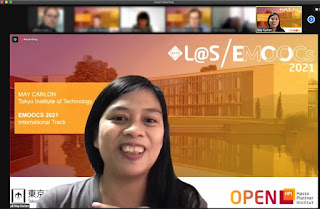EMOOCS 2021: Investigating mechanical engineering learners’ satisfaction with a revised Monozukuri MOOC
This venue has been the perfect place for us to showcase our work at OEDO. People were excited about the Japanese cultural aspects we imbibe into our MOOCs and our efforts for continuous improvement were appreciated.
For a copy of relevant materials (e.g., presentation, paper) or any questions you may have, please feel free to reach out to me through the Contact Me gadget on this blog's sidebar.
Details
Title: Investigating mechanical engineering learners’ satisfaction with a revised Monozukuri MOOC
Authors: May Kristine Jonson Carlon, Mohamed Rami Gaddem, Cesar Augusto Hernandez Reyes, Toru Nagahama, Jeffrey S. Cross
Date: June 22 to 24, 2021
DOI: 10.25932/publishup-51030 (open access)
Abstract
Aside from providing instructional materials to the public, developing massive open online courses (MOOCs) can benefit institutions in different ways. Some examples include providing training opportunities for their students aspiring to work in the online learning space, strengthening its brand recognition through courses appealing to enthusiasts, and enabling online linkages with other universities. One such example is the monozukuri MOOC offered by the Tokyo Institute of Technology on edX, which initially presented the Japanese philosophy of making things in the context of a mechanical engineering course. In this paper, we describe the importance of involving a course development team with a diverse background. The monozukuri MOOC and its revision enabled us to showcase an otherwise distinctively Japanese topic (philosophy) as an intersection of various topics of interest to learners with an equally diverse background. The revision resulted in discussing monozukuri in a mechanical engineering lesson and how monozukuri is actively being practiced in the Japanese workplace and academic setting while juxtaposing it to the relatively Western concept of experiential learning. Aside from presenting the course with a broader perspective, the revision had been an exercise for its team members to work in a multicultural environment within a Japanese institution, thus developing their project management and communication skills.

Comments
Post a Comment